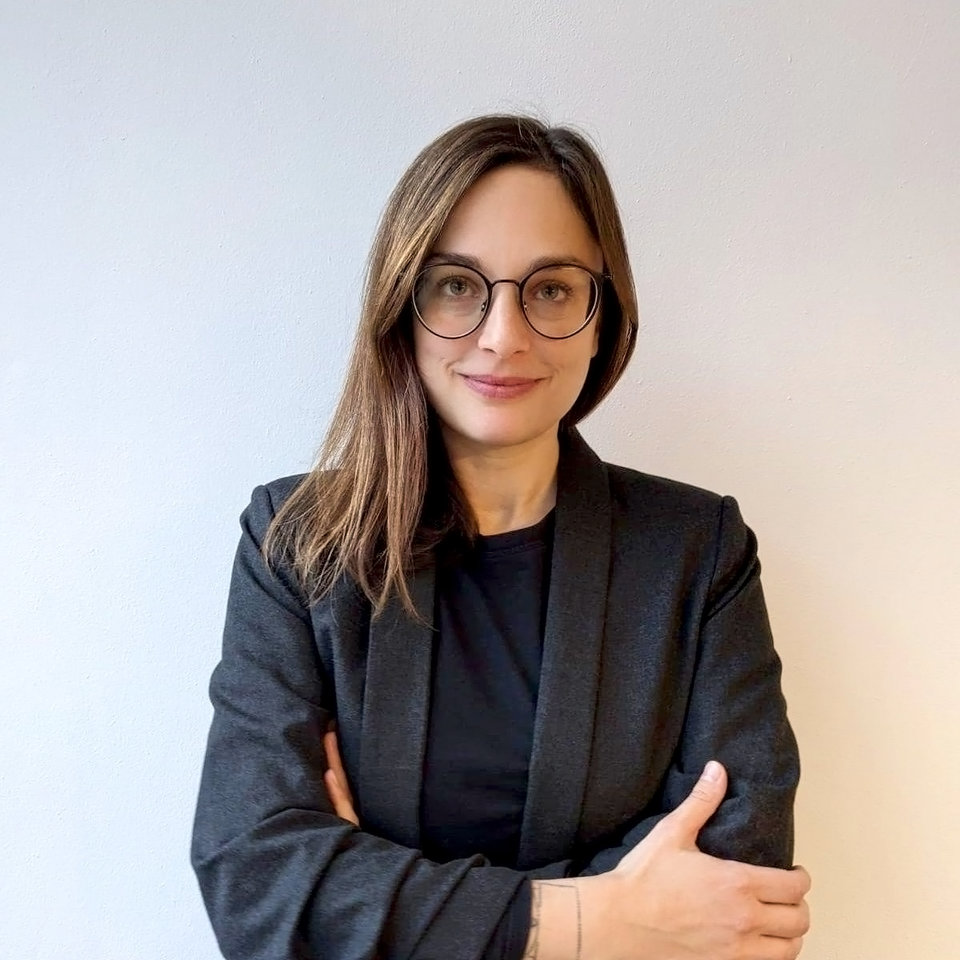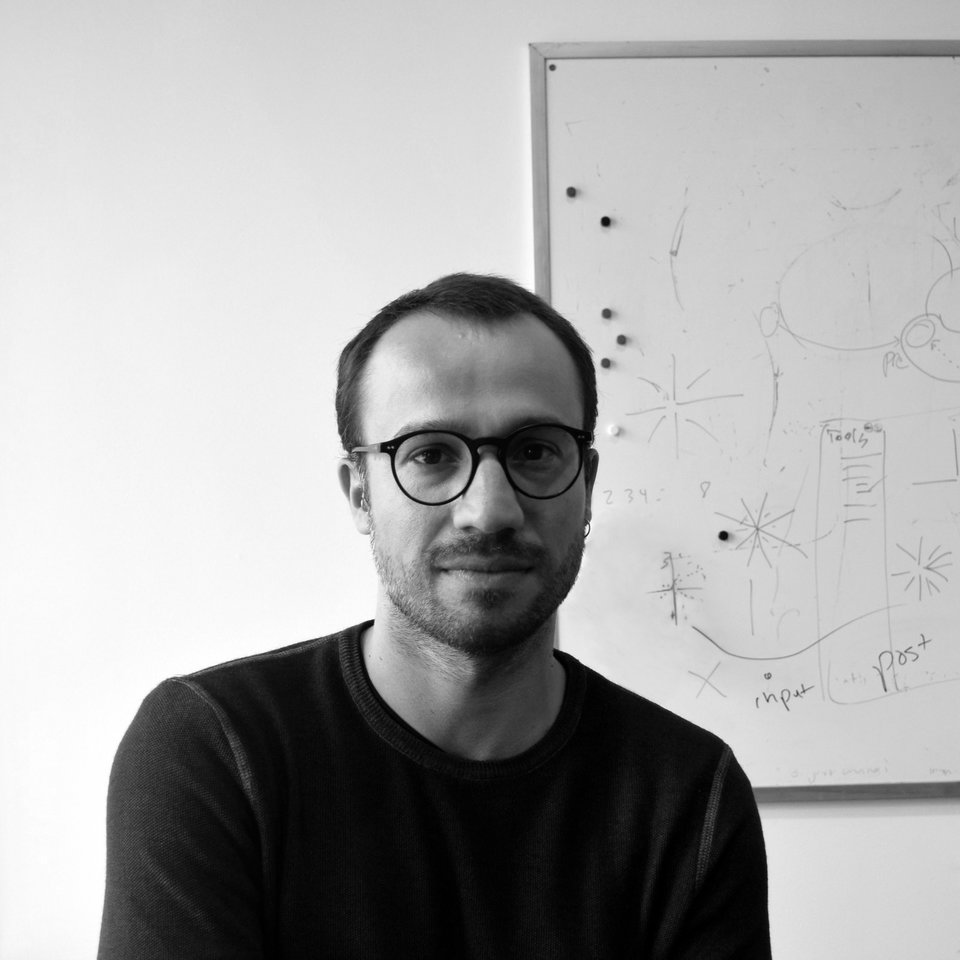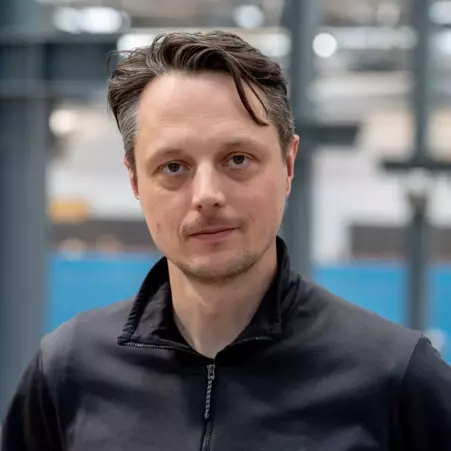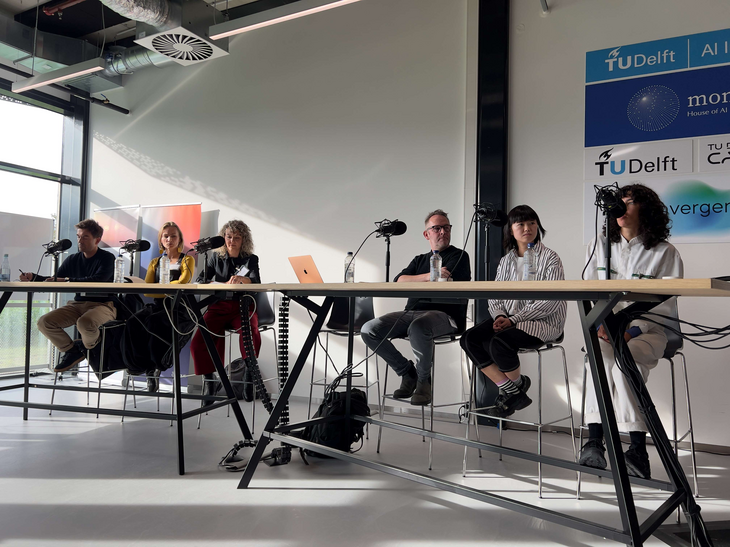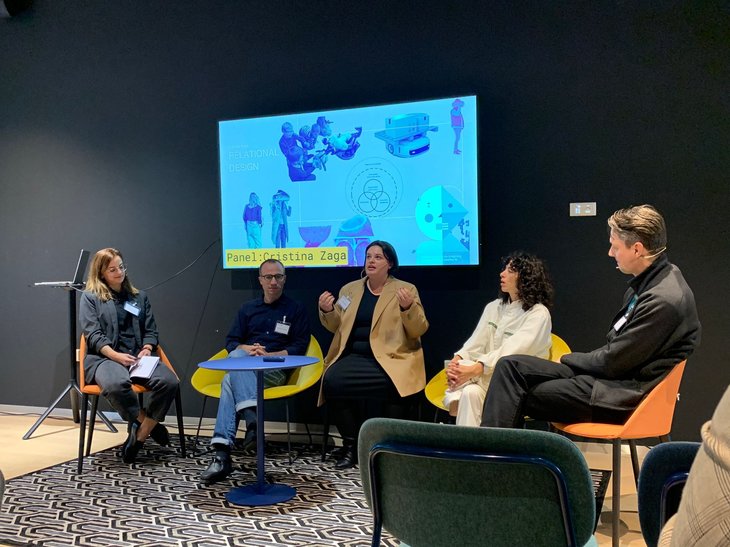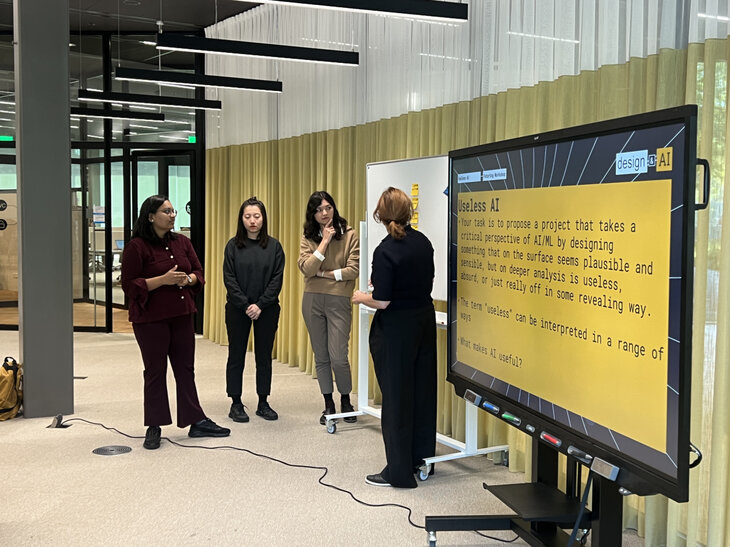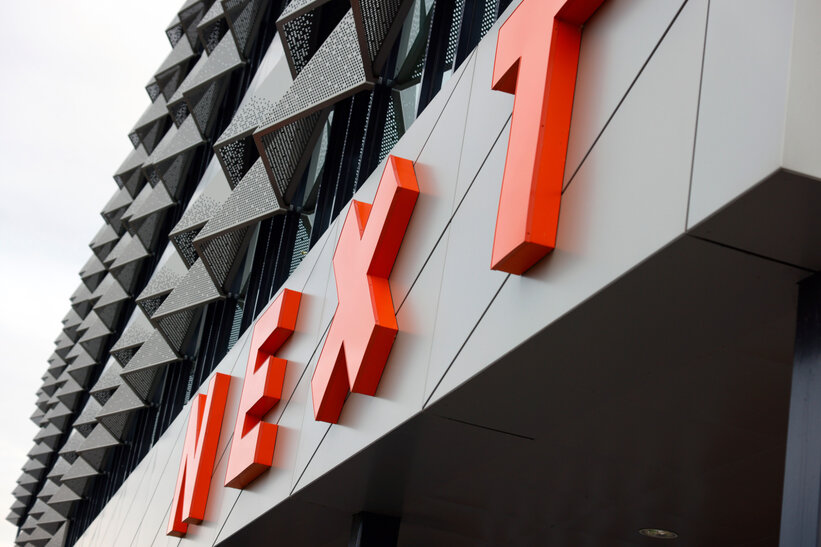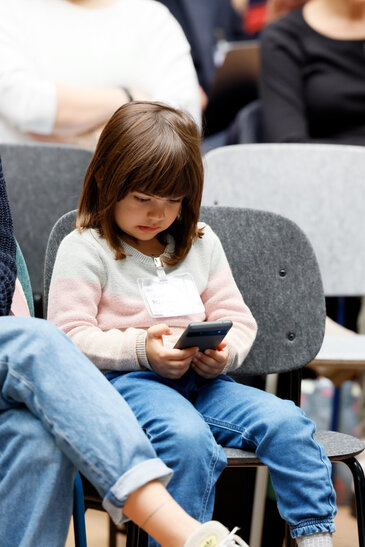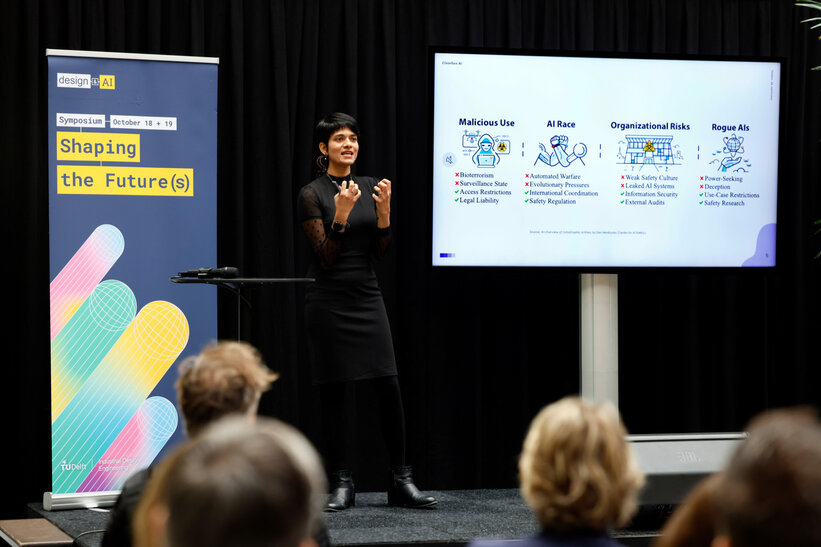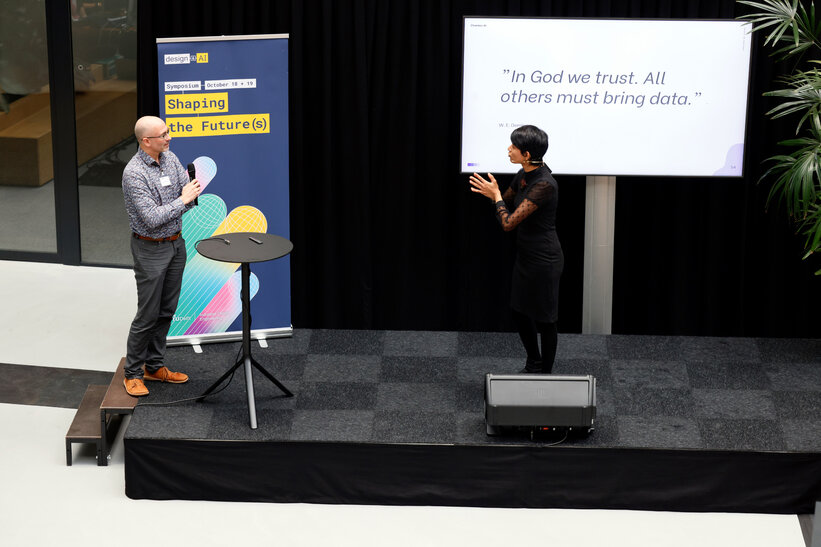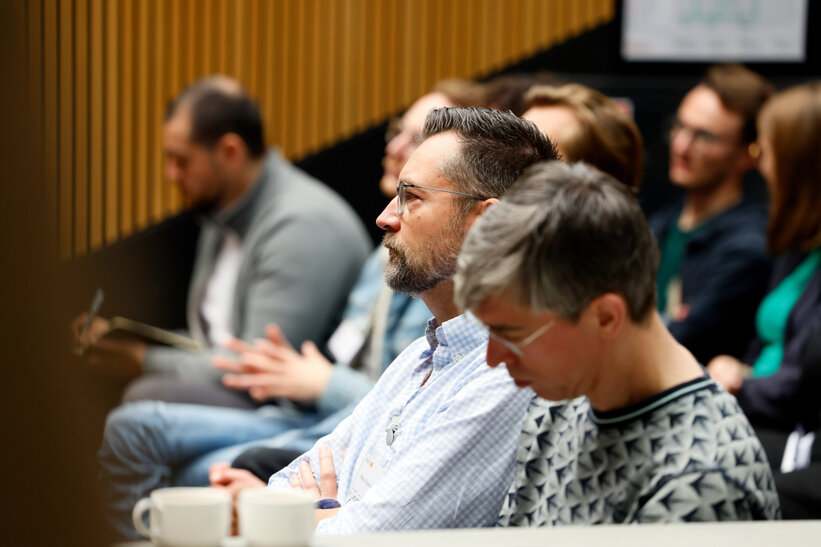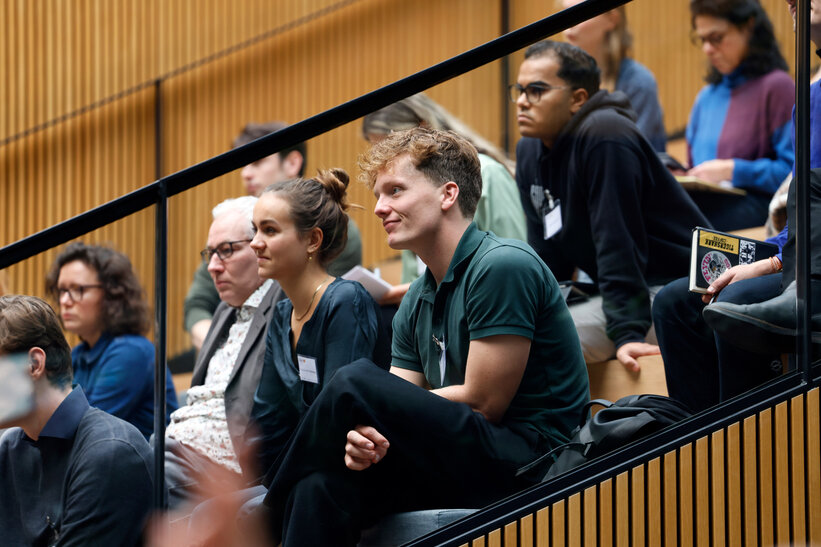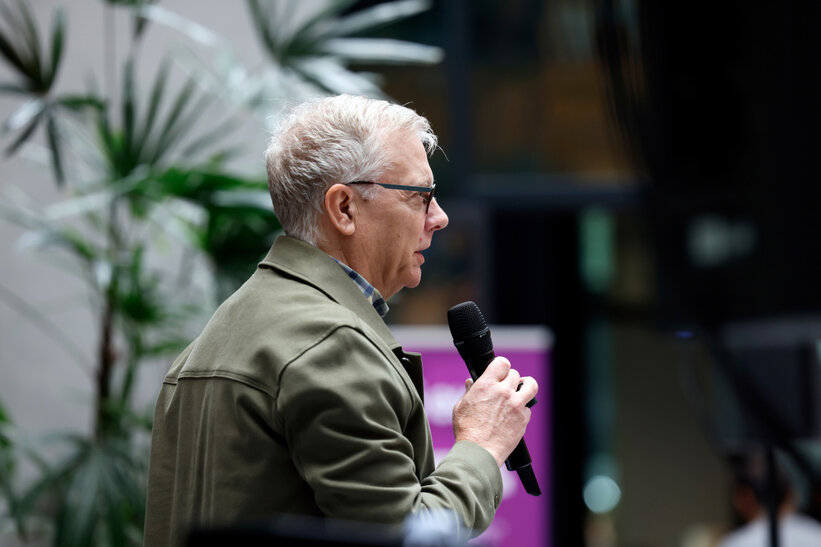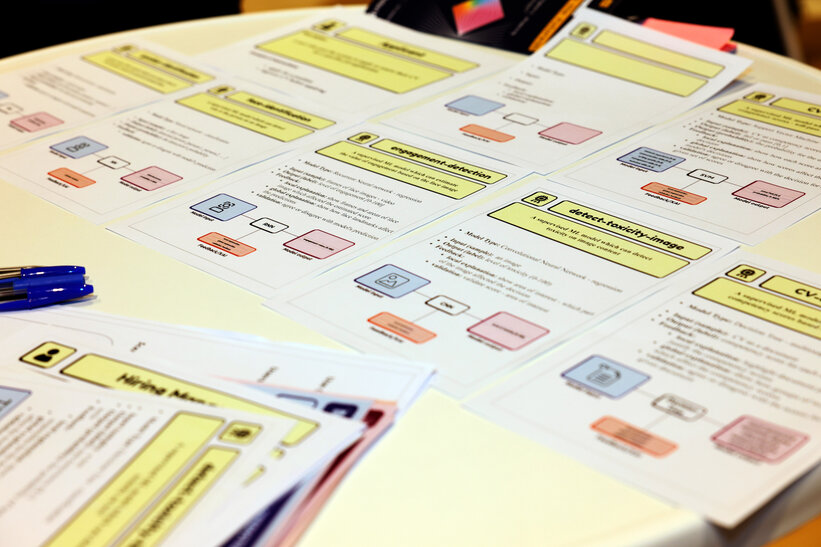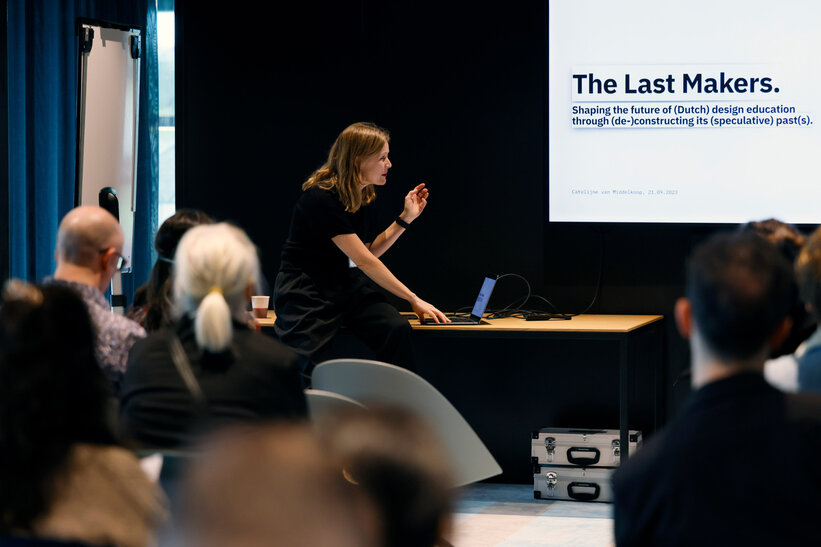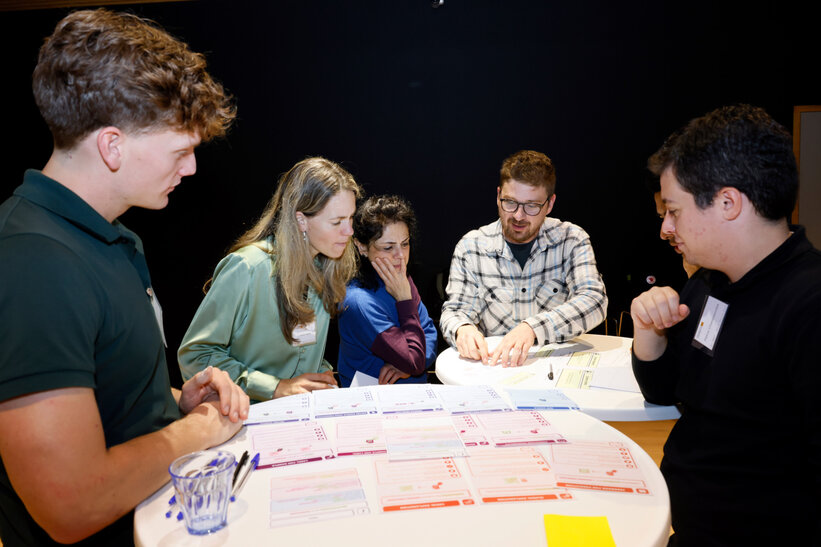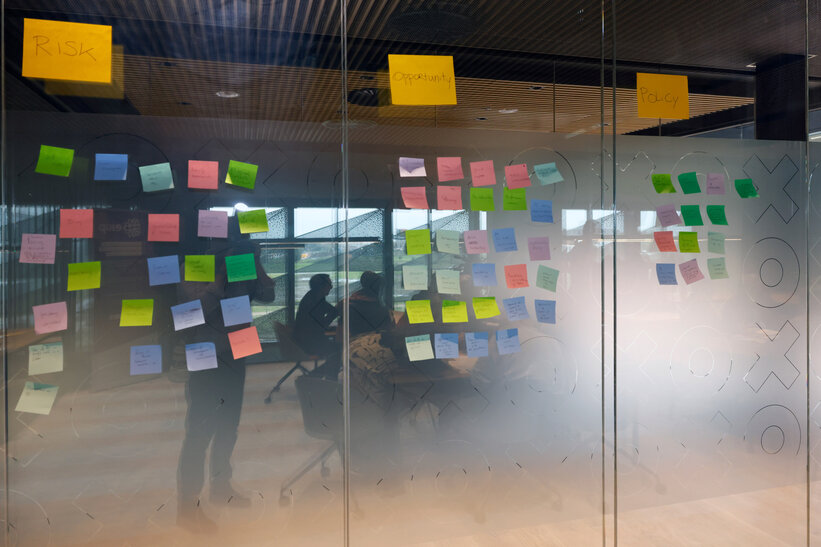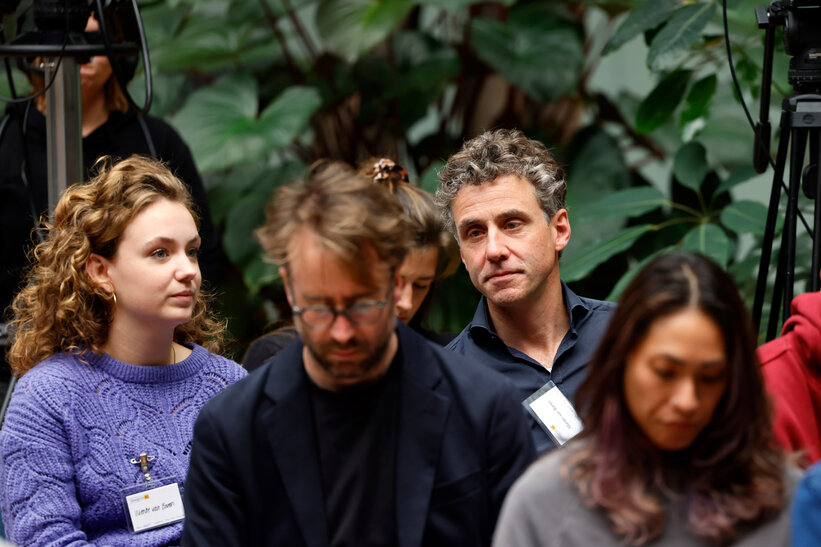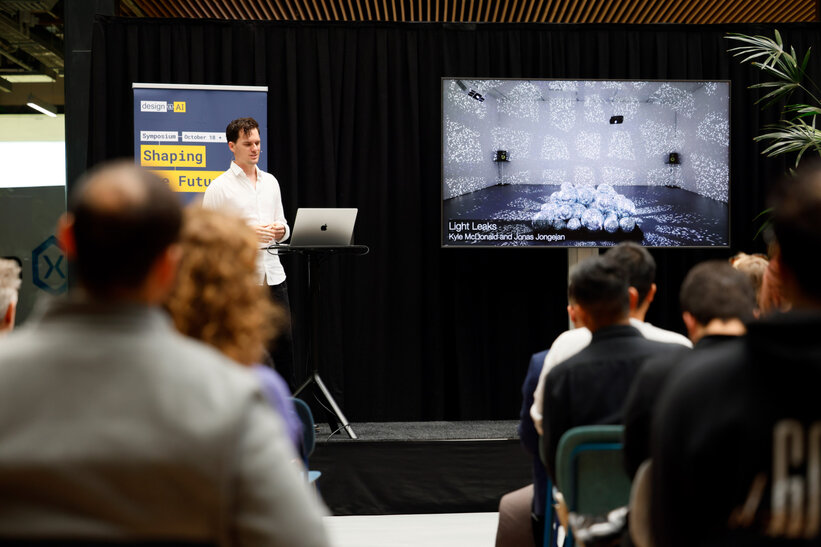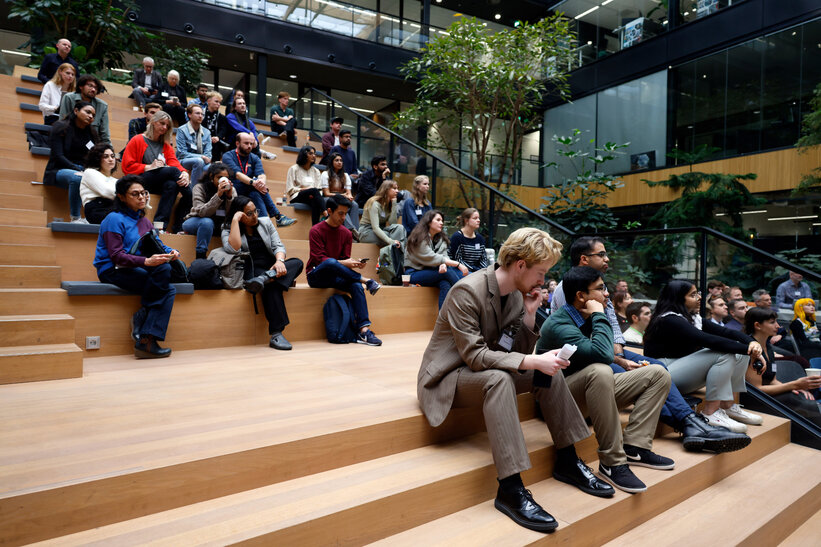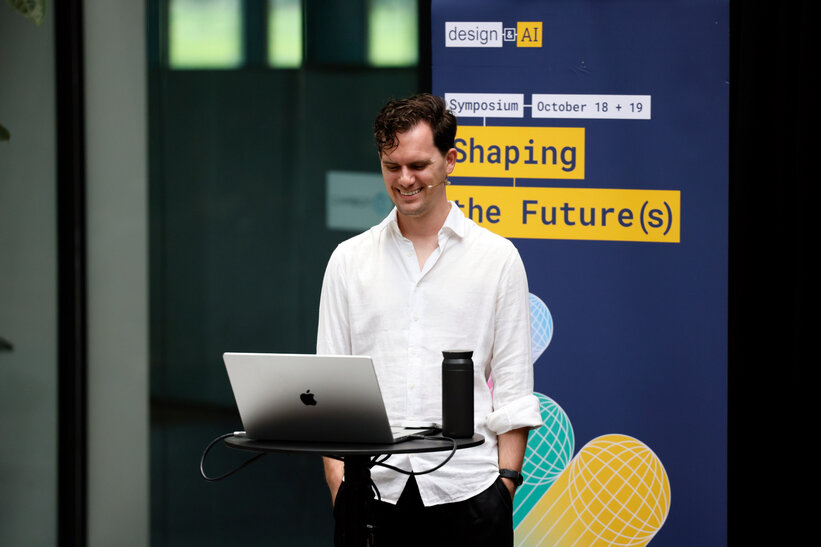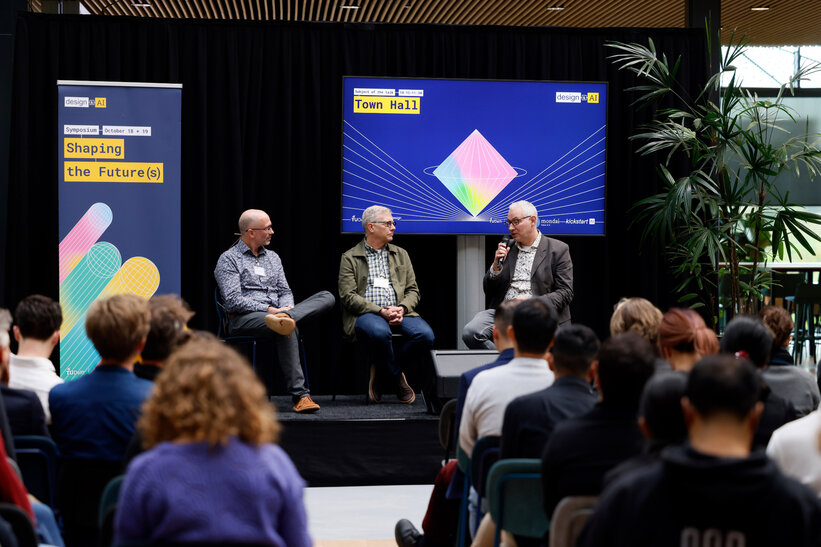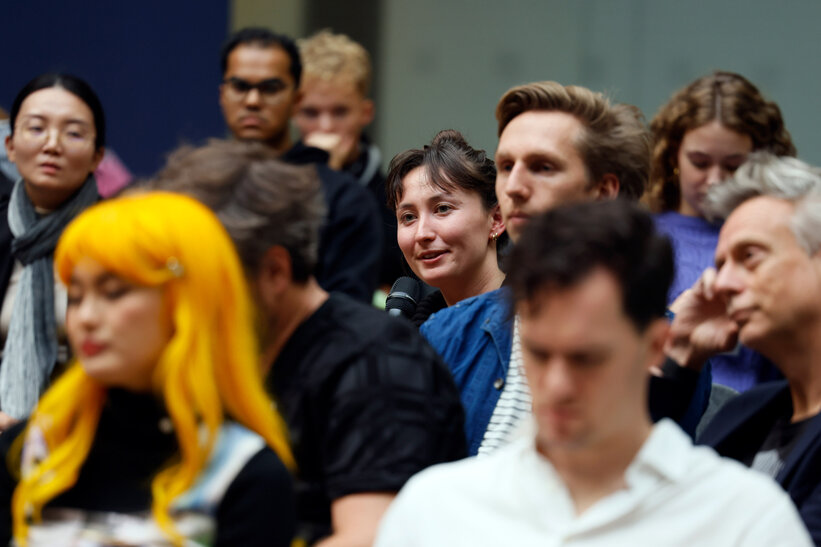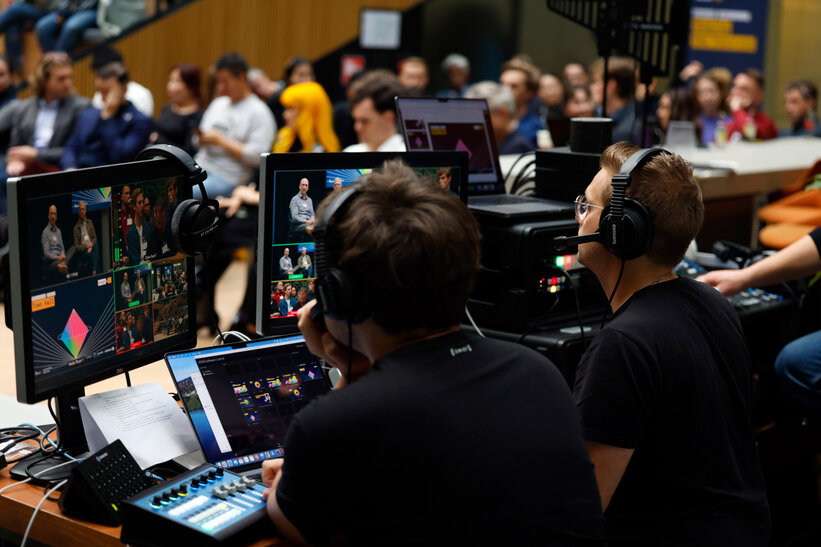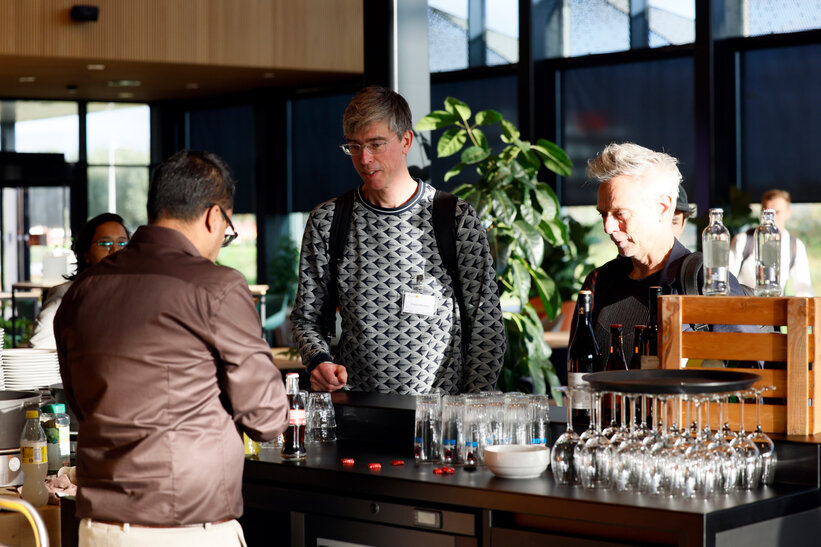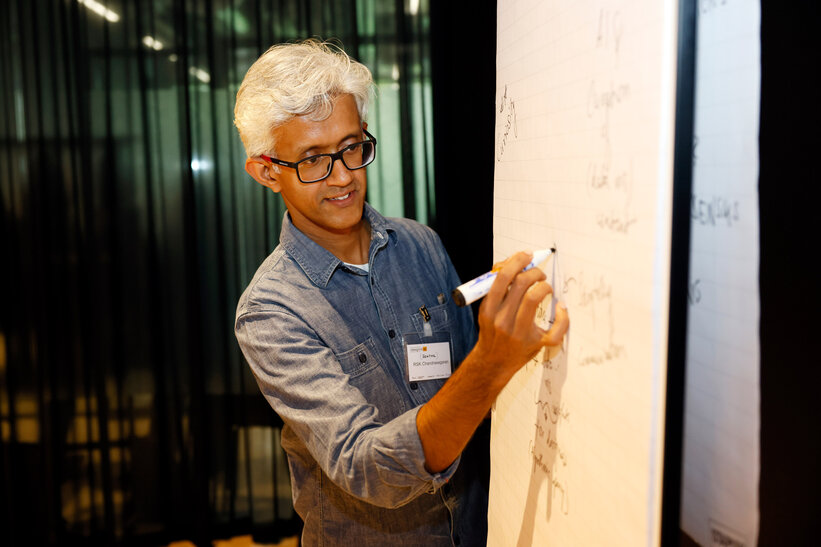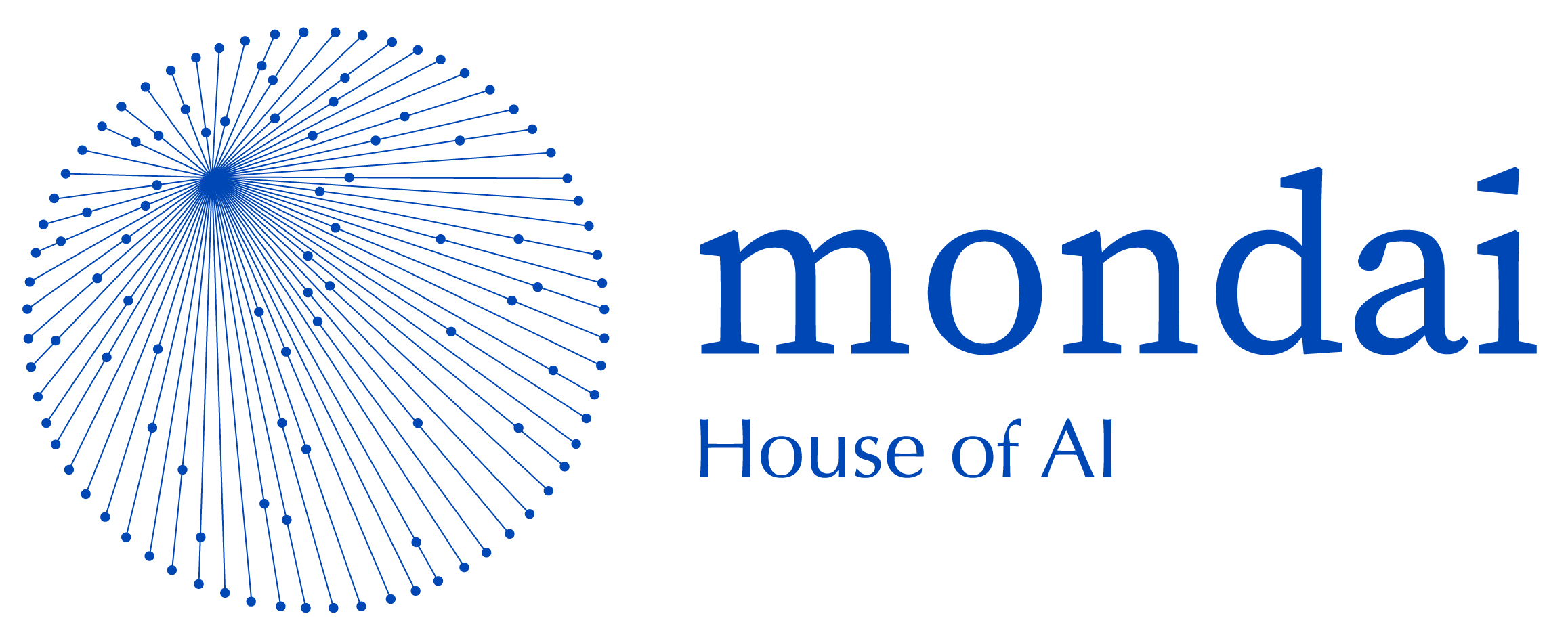DESIGN & AI SYMPOSIUM 2023 | TU DELFT
Design & AI Symposium 2023
SHAPING THE FUTURE(S)
18 and 19 October 2023 - Campus of TU Delft, The Netherlands
What happened?
On 18 and 19 October 2023 at the Campus of TU Delft, The Netherlands, we hosted our second annual sold-out Design & AI Symposium. The theme this year was “Shaping the Future(s)” and we focused on how design can shape Artificial Intelligence to better serve society. We have listened to inspiring keynotes by Shalini Kurapati (CEO Clearbox.AI), Elsje van Niekerk (Co-Owner Oltmans van Niekerk), Kyle McDonald (Artist Working with Code) and Stephan Wensveen (Full professor of Constructive Design Research in Smart Products, Services and Systems, TU/e). Additionally, there was a workshop on ekip on Policy for the Cultural and Creative Industries, an unconference, talk sessions by researchers, and expert panel, and a demo room. The days were hosted by IDE’s own Dave Murray-Rust and Philip van Allen. Read about our event and watch recordings of the keynotes and panel discussion.
2024 Design & AI Symposium in Eindhoven
In addition to the above, we made an important announcement that the 2024 Design & AI Symposium will be hosted in Eindhoven in collaboration with TU/e and around Dutch Design Week.
In the 2023 Design & AI Symposium we asked: How are designers shaping possible futures? The symposium was held on the campus of TU Delft and was presented by the Faculty of Industrial Design Engineering. At this event, attendees joined fellow designers and businesses to explore the intersection of design and the future of AI.
AI has captured the imagination of the public, science and industry, but it also poses new risks and potentials that are reshaping human relationships with technology, labor, creativity, and the environment. Can design help ensure that these systems are practical, just, sustainable and used for the benefit of society?
Shaping the Future(s) - Reflections on the 2023 Design & AI Symposium
By Philip Van Allen and Dave Murray-Rust
The 2023 Design & AI Symposium was once again a sold-out event with over 150 attendees from around the world, including design practitioners, members of industry, students, and academics. We had keynotes from the local design community (Oltmans Van Niekerk), international AI thought leaders (Shalini Kurapati CEO Clearbox.ai) and world famous creative AI practitioners (Kyle McDonald). In addition to the keynotes, we hosted a diverse programme of talks on Design and AI with topics such as Wellbeing, Performance, Reflexivity and Education - with presenters from TU Delft, Tu/Eindhoven, and Universiteit Utrecht.
We had 4 workshops, covering the creation of just and pluralistic AI futures, experimenting with speculative approaches to understanding the bestiary of AI models, working with AI in Education, and prototyping interactions between humans and AI systems. In addition to the talks and workshops we held an Unconference, which captured many questions in the community about how to work with Design and AI. We also hosted a workshop led by Jeroen van der Aa (TU Delft) about shaping policy for the Cultural and Creative Industries around AI (ekip), which brought in external stakeholders in policymaking.
As a bonus event, the day before the symposium, Maria Luce Lupetti, Phil Van Allen, and Dave Murray-Rust conducted a futuring workshop where we produced an imaginary issue of the ACM Interactions Magazine from 2043.
Building on the success of the last two years of the Design & AI Symposium, we announced that the 2024 version will be presented in Eindhoven in collaboration with TU/e and will coincide with Dutch Design Week.
-
Futuring Workshop
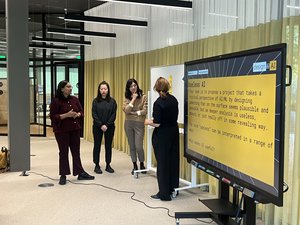
In cooperation with two pioneering TU Delft AI Labs and the generous funding of the TU Delft AI Initiative - AI Futures Lab and AI as Deliberative Multimodal Systems Maria-Luce Lupetti, Dave Murray-Rust and Philip van Allen organised a 1 day workshop: “AI Design Futures Charette 2023, Volume 1” with the intention to create speculative concepts for products, articles, editorials, advertisements, features and everything else that might be featured in a magazine from the future. After introductions of 20 or so people (participants came from both academia and industry including some from Cambridge University, Umea, TU/e, City of Things Foundation, and Sorbonne University), we started with a warmup exercise called “Useless AI” where small teams designed proposals responding a brief to create an AI system that on the surface seems sensible but upon deeper analysis is actually useless. This process then flowed into brainstorming for the magazine content itself.
The outcome of the day was (with the help of ChatGPT and Stable Diffusion) a fully formatted PDF based on Interactions Magazine published by the ACM, which is a key publication for the HCI community. This was then presented to on the first day of the Symposium for responses by a Panel of AI experts. The PDF was also sent to the actual editor of Interactions who was intrigued and interested in having further discussions about how the imaginary magazine might be featured in some way by the “real” magazine.
We believe this kind of design fiction serves an important role in the development of AI and can anticipate unexpected strange, exciting, dangerous, and even useful future uses for AI.
-
ekip Innovation Policy Platform for the Cultural and Creative Industries
In this policy workshop, we had a nice group of twenty participants to explore the intersection of design and AI and the role that policies can play in shaping this landscape. We started with a thought-provoking exercise, imagining utopian and dystopian scenarios resulting from AI in design. This led to discussions about AI's role in speculating design consequences and concerns about overreliance and laziness on rapidly generated ideas and prototypes. We then matched up the utopian and dystopian futures translated to actual needs and ideated on how these could be addressed with policies. We used the OPSI model to diversify policy ideation along bottom-up vs. top-down approaches and incremental vs. future-proof solutions.
Throughout the discussions different themes emerged. Participants grappled with the question of how AI could best serve as a supportive tool instead of becoming the sole source of truth full of biases. Or what consequences does the democratization of creative tools mean? Ideas also started around the formation of 'AI clubs' to foster decentralized and bottom-up skill sharing. The workshop showed there is a wide variety of topics where policies could support the AI & design field and there is lots more to discuss!
-
Unconference
First, what's an Unconference? In short, it is where the attendees can create the schedule at the start of the session – it’s not planned out in advance like a regular conference. It's more casual and open, where everyone has a chance to contribute and decide what they want to talk about.
We ended up having nine different sessions, chosen by the
- Image Generating AI
- Ethics, AI & Design - Law & Democracy
- AI Trend Analysis & Futuring
- Practical Uses of ChatGPT in Design
- AI & Creativity
- AI for Social Good: Designing for Impact
- AI & UX/UI Design - Automation & Human in the loop
- AI & Data Visualization
- AI & Sustainable Design, design for values
Programme 2023
Discover the Design&AI Symposium 2023 programme below...
-
13:00 - Welcome
13:15 - Panel - Shaping the Future(s)
Moderated by Maria-Luce Lupetti
Panelists: Baptiste Caramiaux, Cristina Zaga, Kars Alfrink, Grace Turtle14:25 - Break
14:30 - Panel - Artefacts from the Future(s)
15:15 - Break
15:30 - Breakout Talks and Workshops
DCODE Live Podcast : Acts of interfacing, Mondai Room (ground floor)
Workshop 1 World Making with Love!?, Next Level Room (ground floor)
Workshop 2 Field Guide to the AI Bestiary, Next Serendipity (1st floor)
Talks 1 - Next 2U + Connection (1st floor)17:00 - Wrap Up
17:15 - Drinks and Networking
-
10:00 - Welcome
10:10 - Introduction - Importance of Design & AI
Stephan Wensveen, Professor Eindhoven University of Technology (TU/e)
10:15 - Keynote - The Future of Responsible AI by Design
Shalini Kurapati, PhD, CEO Clearbox AI10:45 - Keynote - Future trends relevant to AI
Elsje van Niekerk, Co-Founder Oltmans van Niekerk11:15 - Break
Interactivities & Demos, Mondai (ground floor)11:30 - Breakout Talks and Workshops
Interactivities & Demos, Mondai (ground floor)
Workshop 3 Ground Shifting: A one-to-one Conversation about AI in Education, Next Serendipity (1st floor)
Workshop 4 Prototyping Human-AI Interactions through Role-Playing!, Next Level (ground floor)
Talks 2, Next 2U + Connection (1st floor)12:45 - Catered Lunch
13:45 - Breakout Talks and Workshops
Interactivities & Demos, Mondai (ground floor)
Unconference, Next Level (ground floor)
Policy experiment: how can EU policies empower the crossover between design and AI? Next 2U + Connection (1st floor)15:15 - Break
15:30 - Keynote - Imagining our Future, in Code
Kyle McDonald, Artist working with code16:30 - Town Hall
17:15 - Wrap Up
17:30 - Drinks and Networking
Featured Workshops, Talks, Panels, and Demos
Discover the featured workshops, talks, panels, and demos below...
Day 1 - Wednesday 18 October 2023
-
Interfaces are not what they used to be. Reflecting on the histories and trajectories of digital interfaces, we look at how they have extended beyond surfaces, buttons and levers to something that cuts across infrastructures and entangles the planet, often beyond access and control. How can we navigate these new terrains?
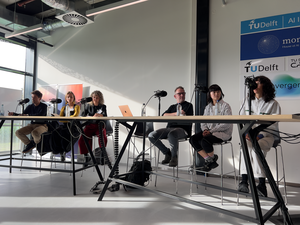
Moderator: Elisa Giaccardi
Panelists: Christian Ulrik Andersen, Ksenia Fedorova, Yuxi Liu, Grace Turtle, Rob Collins
Location: Mondai Room (Ground Floor)
Christian Ulrik Andersen is an Associate Professor at the School of Communication and Culture at Aarhus University. His research on interface criticism provides critical perspectives on contemporary digital interfaces. His book (with Søren Pold) The Metainterface (MIT Press, 2018) examines the aesthetic, cultural, and infrastructural implications of today’s interfaces.
Ksenia Fedorova is a media art researcher and lecturer at Leiden University. Her book Tactics of Interfacing (MIT Press, 2020) explores the changing notion of the self and ways in which it relates to the world in the context of digital technologies and through the process of interfacing.
-
World Making with Love!? A collective and open manifesto for just and pluralistic AI futures - Meike Hardt
Next Level (ground Floor)Within this workshop, we are going to discuss “love” as a political framework and critical lens to “wrestle” with power dynamics inscribed in current AI design practices. Love has been discussed in intersectional feminist movements and theories as a relational and affective force for transforming racism, patriarchy, sexism, and capitalism.
Field Guide to the AI Bestiary - Pei-Ying Lin - Participatory Taxonomies Building Session
Next Serendipity (1st Floor)This workshop aims to develop a series of methodologies to study the ‘bestiary’ of artificial intelligence as if it were a subject of natural science. Pei-Ying Lin, Janet Yi-Ching Huang, Pauline Vaandrager, Anna Merl, Rick Knops - Eindhoven University of Technology, Garden of Forking Paths
-
Well Being & Health
Next 2U + Connection (1st floor)- Embracing AI’s Imperfections: Rethinking the Role of AI in its Relationship with Humans - Elcin Hanci & Minha Lee
- Aesthetics of algorithmic care - Karin Bogdanova
- Wellbeing, what else? Prioritizing human flourishing in AI alignment - Willem van der Maden
Performance
Next 2U + Connection (1st floor)- Putting Movement First: An Exteriority Perspective on the Design of Human-Robot Interactions through the Performing Arts - Alcubilla Troughton, I. (Irene)
- Dramatic Things: Enacting the value conflicts at smart home - Nazli Cila and Maria Luce Lupetti
- The Performing Arts as a Lens for Technical Advances in Human-robot Interaction - Kim Baraka
Day 2 - Thursday 19 October 2023
-
AILIXR - Ruben Dekker - Interactive canvassing and prototyping tool for AI
AILIXR is a digital canvassing tool (similar to Miro). In addition to standard canvassing features (notes, drawings, etc.), users can create functional, digital prototypes and workflows using an intuitive node editor. The tool enables the collaborative design and rapid prototyping of ML pipelines, and it is aimed at students, UX designers and data scientists.Mix & Match ML Toolkit - Anniek Jansen, Sara Colombo - A hybrid physical-digital toolkit
A hybrid physical-digital toolkit, which provides relevant ML knowledge to UX designers to support their ideation processes. The toolkit features a set of tangible tokens representing data types and ML capabilities, a sensing board, and a web interface.No Problem Department - Wendy Wen - A Sciffle Box game for value communication
A serious game to enhance corporate value communicaion through a game developed using ChatGPT and the Sciffle Box. Sciffle Box is a gaming diverse with four scanners that allow players to interact with ChatGPT by scanning cards with QR codes. The game aims to bridge the gap between personal and corporate values, fostering deeper understanding and alignment among employees.Prediction of 3D Fabric physics through AI - Yulia Zelenina - Creation of realistic 3D models that accurately represent the characteristics and textures of various fabrics
This research project aims to bridge the gap between the physical and digital realms by leveraging AI techniques for fabric physics classification. The ultimate goal is to enhance fidelity and realism in 3D modeling and simulation, allowing users to interact with digital fabrics in a way that closely resembles real-world materials.Personal companionship POS - Eric Gu - Challenging the future of the subscription models
This installation is a satirical piece of challenging the future of the subscription models in combination with AI and customization. The installation is a digital shop, where visitors can choose their own preferred digital companionship in the form of a bot. There is a standard model, but when the visitor wants more features (such as more humor, or more compassion), the visitor “pays” more. When finishing the preferred model, the visitor will get a receipt with a QR code, that let’s them interact with the customized chatbot that is run through AI.Game we'll never play - This is not a DUO - A variation of Guess who? A game based on facial recognition.
How would we play such a game if the faces were incredibly similar, all look-alike to each other? The ones that appear in this game were generated in multiple sets via a StyleGAN neural network, trained to render human faces. The genetic traits of each face in a set have been calibrated to be unique, yet extremely similar to the others in that specific set.Coloured Realities - Sukriti Garg - This installation challenges the filter people see the news through
News has always needed to be objective and written through journalistic criteria. However, with new media (such as social media), it is harder to see which news is real or subjective. Additionally, values and style of writing is a personal, subjective preference. This installation challenges the filter people see the news through, by customizing current news articles with two settings to choose from, 1) the writing style and 2) values. A news article is shown on a screen and the visitor is invited to turn two buttons with different settings. Once the two settings are chosen, the news article changes with AI into a new article, written in the preferred style and with the value in mind. For example, a “poetic” writing style, means that the text is written in rhyme and choosing the value “conservative”, the news article is written with a right wing political stance. The visitor is faced with a reflection in how they receive news, knowing that they are part of a bubble. -
Ground Shifting: A one-to-one Conversation about AI in Education
Heba Daghstani, Fleur Van StratumNext Serendipity (1st floor)
In this workshop, participants will engage in one-to-one conversations following the Ground Shifting method. By Unraveling their thoughts on AI in Education, participants will explore their assumptions and aspirations. Through reraveling, they will engage in introspection, reassessing their perspectives and critically examining their ideas. Finally, in the shifting phase, participants will collectively question the processes and knowledge surrounding AI in Education, leading to innovative insights and collaborative solutions.
Prototyping Human-AI Interactions through Role-Playing!
Kostas TsiakasNext Level (ground floor)
This workshop aims to bring together designers to explore this method for prototyping interactions between users and AI models. Through a set of role-playing activities, we will engage the participants in creating and presenting their own HAI interaction scenarios. The goal is to raise a discussion and share insights towards supporting the co-creation of HAI interactions taking into consideration high-level design guidelines and frameworks for Responsible AI.
-
Reflexivity
Critical Data Curation: Crafting Human-AI Reflexive Practice
Anne, Arzberger, Maria-Luce Lupetti, Elisa GiaccardiExploring the Interstitial Space Between Prompt and Imagination: ‘When Images Remain. A Visual Polemic in 8 Acts’
Catelijne van MiddelkoopEducation
Experiential Speculation in Vision-Based AI Design Education: Designing Conventional and Progressive AI Futures
Janet Yi-Ching Huang, Stephan Wensveen, Mathias FunkGrasping AI: experiential exercises for designers
Dave Murray Rust, Maria-Luce Lupetti, Iohanna NicenboimGenerative AI in Design: Serendipity, Randomness, or Chaos?
Eric Heng Gu -
AI & Design is a fast-moving field with many emerging developments. That's why we are hosting an Unconference format on the second day of the Symposium.
An Unconference is a bottom-up event that makes it easy for participants to discuss any topic that they find important. It is very simple! We start by gathering topics of interest from the attendees. Then we organize short 20 minute sessions, based on those topics. This is a chance to propose ANY topic to discuss — and hopefully, to find and engage with people who share (or disagree with) your interests.
Before the symposium, we'll send out an email to all participants that links to a form to submit your favorite topics for the Unconference. At the Symposium itself, we will encourage attendees to add new ideas.
-
Policy experiment: how can EU policies empower the crossover between design and AI?
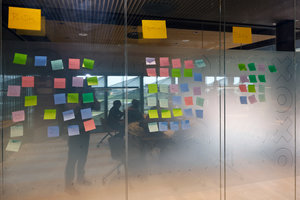
Participatory workshop for developing recommendations to the European Commission on how to support Innovation on and with AI for the Cultural and Creative Industries (CCIs).
At the AI Policy Corner experiment you have a direct say in the policies the European Commission should develop on AI for the CCIs. You are invited for mapping opportunities and influences related to AI, define and prioritise potential policy areas and suggest future Research and Innovation actions the EU should support.
The AI Policy Corner experiment is organised by the European Cultural and Creative Industries Policy Platform (ekip). This Horizon Europe project is developing a network-driven policy recommendation engine to continuously drive the formulation and adoption of policy development recommendations for Europe’s Cultural and Creative Industries (CCIs). The AI theme is the first policy area ekip will advise the European Commission on. More information: www.ekipengine.eu

Featured Speakers
-
Abstract: Why is design & AI so important. Stephan will discuss the important role that design plays in the development of fugure AI products and services. He will also have an important annoucement about the future of the Design & AI Symposium.
---
Bio: Stephan Wensveen is full professor of ‘Constructive Design Research in Smart Products, Services and Systems’ in the Future Everyday group of the Department of Industrial Design at Eindhoven University of Technology (TU/e).
He studied Industrial Design Engineering (MSc, PhD) at Delft University of Technology. In 2002 he joined the Eindhoven University of Technology and helped in the start-up of the department of Industrial Design. In 2011 he expanded his horizon on multi-disciplinary design and Participatory Innovation when he joined the University of Southern Denmark. Since 2013 he is back in Eindhoven.
His initial research was on the relationship between emotions, expressivity and interaction design through which he helped introduce notions of ‘aesthetics of interaction’, ‘feedforward’ and ‘interaction frogger' and he is co-responsible for canonical examples of Research through Design. He has always been interested in using the power of design to integrate research, education and innovation, co-establishing the /d.search-labs (2006), the Wearable Senses lab (2008) and projects on Ultra-Personalized and on Smart Textile Product Services (2011). Many of his papers are part of the standard curricula in interaction design schools and he is co-author of the book ‘Design Research through Practice’ and editor at the International Journal of Design.
His most recent interest is in the development of designers’ competence in ‘aesthetics of intelligence’.
Keynote Video
-
Abstract: The unexpected evolution of foundation models into mainstream generative AI tools like ChatGPT and Midjourney has shaken up industry and societal perspectives. As a result, our conventional wisdom on designing, governing and regulating AI is challenged. For instance, chatbots were considered low-risk AI in the EU AI Act draft text just a few weeks before the launch of ChatGPT. The same can be said about the complexities of determining and asserting ownership or rights on data used for training as well as the outputs of AI.
In this talk, Shalini will highlight the opportunities and challenges in designing responsible AI systems, focusing on critical issues of privacy, fairness, and creative/IP rights in the era of generative AI. She will present the current and emerging technological solution space for responsible AI, focusing on synthetic data, her company's specialization.
Bio: Shalini leads the strategy, operations and business development at Clearbox AI with her multi-disciplinary expertise at the intersection of Technology, Policy and Management. Before Clearbox she successfully co-founded an AI consultancy in the Netherlands and was in the pilot team of the data stewardship project at TU Delft.She has a strong R&D background and practical expertise in data management, data privacy and data stewardship. She specialises in transparency, privacy and fairness issues across data life cycles as well as algorithms.
Shalini has a wide ranging international professional experience in the Netherlands, Sweden, India, United States and most recently Italy. She is an effective communicator and trainer and a regular speaker at conferences on research data management and transparency of data life cycles.
Shalini holds a PhD from Delft University of Technology. During her PhD she studied the performance and operational resilience of automated and semi automated container terminals in the port of Rotterdam. She has worked in the innovation departments of Volvo CE, Sweden and Hyundai Motors in India.
Shalini is also a Certified Informational Privacy Professional/Europe (CIPP/E) with a demonstrable knowledge of GDPR and European e-Privacy laws.
In her free time Shalini likes to explore the nature, food and culture of Piedmont, Italy.
Keynote Video
-
Abstract: Elsje van Niekerk delves into the drivers of change expected to shape the landscape leading up to 2025, based upon the research of OvN’s Vision 2025 publication. She illuminates how AI can play a pivotal and constructive role in driving transformations and shows the impact of AI across diverse sectors, from automotive, technology, fashion, sports to interior design.
Bio: Oltmans van Niekerk specializes in examining, deciphering, and delivering insights on the political, economic, social, and technological shifts that impact people, their beliefs, their surroundings, emerging products, and the dynamics of businesses.Since 2005, Elsje van Niekerk has been a co-owner of Oltmans van Niekerk. Rooted in a design-oriented background, she possesses an inquisitive nature and a keen interest in comprehending the trajectory of where our world is heading.
Shalini is also a Certified Informational Privacy Professional/Europe (CIPP/E) with a demonstrable knowledge of GDPR and European e-Privacy laws.
In her free time Shalini likes to explore the nature, food and culture of Piedmont, Italy.
Keynote Video
-
Abstract: What is the role of artists working with AI? What happens when we've had enough of the image generators and uncanny language models? What can we learn from these tools about ourselves, and about our collective future(s)? Kyle will explore the ways that machine learning intersects with everything from public spaces and personal relationships to cetacean bioacoustics and language itself.
Bio: Kyle McDonald crafts interactive installations, sneaky interventions, playful websites, workshops, and toolkits for other artists working with code. Exploring possibilities of new technologies: to understand how they affect society, to misuse them, and build alternative futures; aiming to share a laugh, spark curiosity, create confusion, and share spaces with magical vibes.Working with machine learning, computer vision, social and surveillance tech spanning commercial and arts spaces. Previously adjunct professor at NYU's ITP, member of F.A.T. Lab, community manager for openFrameworks, and artist in residence at STUDIO for Creative Inquiry at CMU, and YCAM in Japan. Work commissioned and shown around the world, including: the V&A, NTT ICC, Ars Electronica, Sonar, Todays Art, and Eyebeam.
Keynote Video
Featured Panelists
-
Maria Luce Lupetti is an Assistant Professor in Interaction and Critical Design at the faculty of Industrial Design Engineering, TU Delft (NL), and a core member of the AiTech Initiative on Meaningful Human Control over AI Systems. Her research, at the intersection of design, ethics, AI and robotics, is focused on promoting critical perspectives in technology development.
Panel Video - Part 1
Panel Video - Part 2
-
Baptiste is currently a CNRS researcher (CRCN) at ISIR, Sorbonne Université in Paris, in the HCI Sorbonne group. He received a PhD in Computer Music from University Pierre et Marie Curie and IRCAM in 2012. He has worked at Goldsmiths College, University of London, and McGill University, as a Marie Skłodowska-Curie Research Fellow. He joined CNRS (CR1) in 2018 at LRI (now LISN), Université Paris-Saclay.
Since 2015, Baptiste has been a senior researcher then consultant at Mogees ltd. He is involved in an European endeavour studying the use of AI in the Creative and Cultural sectors. Finally, He is collaborating on art projects, being an associate member of the Fronte Vaccuo collective.
-
Cristina holds a Ph.D. in Computer Science (cum laude) and a double MSc in Cognitive Science and Human-Media Interaction (cum laude). Her research focuses on relational design and transdisciplinary research. She develops methods, tools, and technology to facilitate societal transitions towards just, caring, and solidarity futures involving communities, nature, and artificial agents. She applies her research in domains such as healthcare and the future of work. Additionally, Cristina leads the Social Justice and AI network, which aims to address the dehumanizing and oppressive impacts of AI and embodied AI technology while promoting social and environmental justice.
Cristina's research is committed to developing methods, tools, and technology that support societal transitions towards futures of justice, care, and solidarity between communities, nature, and artificial agents. Cristina focuses on developing methodology inspired by design research that can support societal transitions through transdisciplinarity, considered a value-driven, pluralistic approach that promotes emergent embodied social learning between communities to tackle societal challenges and bring out social change.Her research's main fields of application are societal challenges related (health)care and technology, the future of work in times of automation and digitalization, health-transitions and technology.
With colleagues at DesignLab of the University of Twente, she co-develops Responsible Futuring, a transdisciplinary approach to tackle societal challenges with academic and non-academic communities. To this end, Cristina merges critical theories, speculative and post-human/more-than-human design, creating methods and tools to make thoughts, ideas, and reflexivity from concrete to tangible through visual scenarios and prototypes and, in so doing, challenging status-quo.
Cristina also leads the Social Justice and AI networks, a Dutch network of academics, students, and activists committed to mitigating and overcoming the dehumanizing and oppressive effects of AI and embodied AI technology and fostering social and environmental justice.
Her award-winning work has received many accolades, including the NWO Science Prince for DEI initiatives (2022), the Dutch High Education Award (2022), and the Google Women Techmaker Award and scholarship (2018). She is regularly invited as a speaker at events (e.g., TEDx), symposia, and international conferences. Cristina regularly publishes papers in top-tier conference venues (CHI conference, HRI conference, DIS, CSCW conference) and is heavily involved in academic service for ACM SIGCHI and Design Research Society.
-
Grace is a designer, artist and researcher queering AI. She has spent over a decade combining human insights with strategic foresight to support leaders in industry and government to navigate change while implementing strategic initiatives, products, and services.
Currently pursuing a Marie-Curie PhD fellowship through the DCODE Network, Grace's research centres on cultural and political dimensions of AI, advocating for queer orientations in the design and use of predictive systems. Grace is also a core member of Becoming, a design futures and research studio that envisions and enacts transitions towards more livable and democratic worlds. Her work has been featured at the Porto Design Biennale, Telefonica Foundation Madrid, PRIMER New York, the World Futures Congress in Mexico City and TEDx Sydney.
-
Kars Alfrink is a designer, researcher, and educator working at the intersection of emerging technologies, social progress, and the built environment. Currently, Kars is a Ph.D. candidate at Delft University of Technology. His research focuses on contestable AI. Before coming to Delft, Kars was active as a design consultant, design entrepreneur, and design community organizer for 15+ years.
Some highlights include co-founding and coordinating Tech Solidarity NL, a grassroots community of Dutch tech workers who seek to advance the design and development of more just and egalitarian technology; founding and co-directing Hubbub, a boutique playful design agency; and initiating and co-curating the Dutch offshoot of This Happened, a series of events about the stories behind interaction design.
Kars has worked as an educator and researcher at the Utrecht School of the Arts and as an interaction designer at several web agencies before that.
Kars holds a master of arts in interaction design (2002) from the Utrecht School of the Arts. He lives in Utrecht, the Netherlands.
Building on our sold-out 2022 symposium, we are expanded to one and a half days for 2023. Scientists and practitioners from multiple disciplines gathered in the beautiful Dutch city of Delft. We discussed the technological, scientific, and societal challenges of building futures with AI-mediated interactions. The symposium showcased local and international Design and AI research from academia and industry, through a rich programme of workshops, talks and discussions.
Whether a seasoned designer, entrepreneur or just starting out, the Design & AI Symposium 2023 was the perfect place to gain new insights, make valuable connections, and expand horizons. This event was an incredible opportunity to be a part of the conversation at the forefront of design and AI!
The Symposium was a program of TU Delft Industrial Design Engineering in collaboration with TU Delft AI Initiative, Mondai | House of AI at NEXT Delft, and KickstartAI.
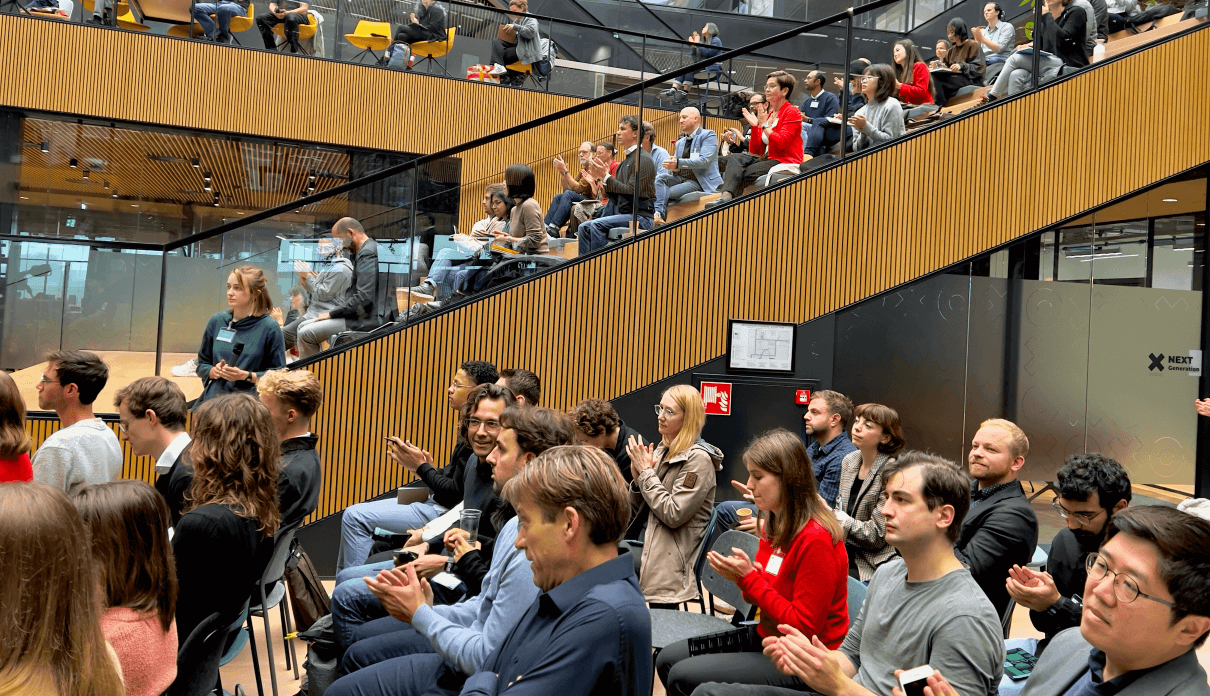
Program Chairs: Dave Murray-Rust, Philip van Allen
Program Committee: Vera van der Burg, Willem van der Maden, Jacky Bourgeois, Nazli Cila, Maria Luce Lupetti, Derek Lomas (Unconference)
What is Design & AI?
Curious how we see Design & AI at the Faculty of Industrial Design here at TU Delft? Watch this video, including interviews with Elizabeth Churchill (Google), John Zimmerman (Carnegie Mellon University) and more.





